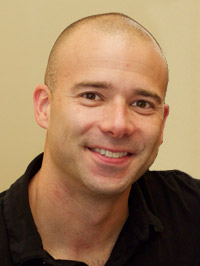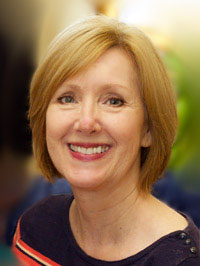Now, what do you see?
Page 1: Learn More About the People in the Challenge
On this page, you’ll find the people you met in the Challenge movie. Take a moment to learn a bit more about them and reflect on this new information. Did learning more change your initial perceptions about them? If so, how? If not, why not?
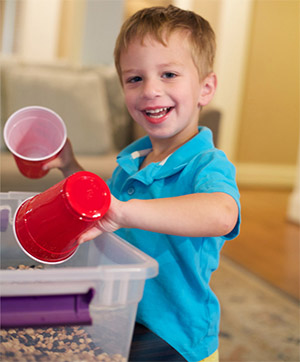 |
Benjamin is a happy, loving three-year-old who happens to have autism spectrum disorder (ASD). Here Benjamin takes part in one of his favorite activities, repetitively scooping dried beans from a tub and dumping them back in again. |
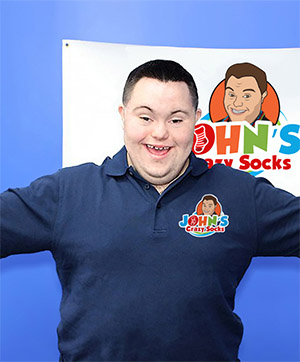 |
John Cronin, a young man with Down syndrome, began contemplating what to do with his life during his last year of high school. Inspired by World Down Syndrome Day, a celebration that encourages participants to wear “crazy” socks with bright colors and loud patterns—one of John’s passions—John and his dad founded John’s Crazy Socks in 2016. Not only has the business exploded, it has offered job opportunities to people with different abilities. Photo is courtesy of John’s Crazy Socks, https://johnscrazysocks.com/ |
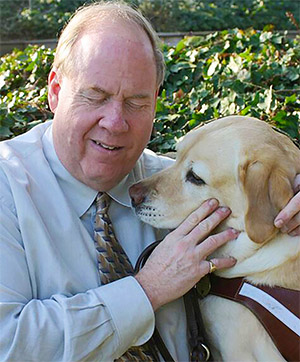 |
Michael Hingson was working as a regional sales manager on the 78th floor of the World Trade Center on September 11, 2001. He and many of his co-workers were able to evacuate the building safely because of Michael’s guide dog Roselle. Michael wrote a best-selling book about his partnership with Roselle—Thunder Dog, the Story of a Blind Man, a Guide Dog, and the Triumph of Trust at Ground Zero—and served as the National Public Affairs Director for Guide Dogs for the Blind. He now tours the United States as a motivational speaker. Photo is courtesy of Michael Hingson, https://michaelhingson.com/ In the video below, Michael explains how Roselle helped so many people on 9/11 and also discusses the importance of positive attitudes and perceptions toward people who are blind (time: 3:22). |
|
Reporter: Michael Hingson and his guide dog have no problem with escalators. Michael has been blind since birth but he can get along just fine pretty much anywhere. On this day he’s speaking to the California State Association of Counties. He’s telling these government leaders how he finally convinced a computer company to hire him as a salesman. Michael: Because as a blind person I have had to sell all my life just to be able to function. I’ve had to sell to be able to ride a school bus. I’ve had to sell to sell to be allowed to go on an airplane with my guide dog. Reporter: Michael eventually became regional sales manager for that company. Michael: I ran the office. I had staff. I had their people call my people and we did lunch every so often. Reporter: Ten years ago he was working on the 78th floor of the World Trade Center when terrorists flew one of those planes into the building. Michael’s co-worker could see fire out of the window. Michael: We said good-bye to each other because we thought we were going to take a 78th floor plunge to the street. Reporter: Michael’s guide dog Roselle was there too. Around the office people began to panic. Michael: But I knew something that nobody else was observing which is that my dog wasn’t acting afraid or indicating that she was nervous in any way. Reporter: That was enough to help Michael calm other workers. In the last ten years he’s told the story of the harrowing trip down the stairs hundreds of times. One of the worst moments was when they finally got outside. Michael: We heard this rumble that quickly became this deafening roar. Reporter: Tower two collapsed. The dust cloud engulfed them. Now no one could see, and they could hardly breathe. They moved forward trying to find a way into a building that was just to their right. Michael: So I kept telling Roselle right right and give her a hand signal and kept saying right right. And I was listening for the opening if there was an opening to go into. Suddenly I heard it obviously Roselle saw it she turned took one step to the right and stopped. Reporter: It turned out they were at the top of the stairway into a subway station. Roselle’s abrupt stop saved them from falling. Then she helped guide them down to safety. Michael: You know it’s teamwork um in every sense of the word. Reporter: Michael lives in Novato (CA) now but (Michael: Thank you.) travels the world (Michael: I’ve got to go catch an airplane.) giving talks about the importance of teamwork. Sadly Roselle died earlier this year at the age of 13. Now a new dog is helping Michael advocate for the blind. Michael: We live in a country where the unemployment rate among employable blind people is 70 percent. Reporter: Michael has a master’s in physics. He’s written a best selling book. He and Roselle were celebrated as heroes. Still he says he’s not that unusual. With a little help from a good dog and good technology Michael: This device I have here is called a Note Taker. Reporter: Most blind people can accomplish a lot if you just give them a chance. Michael: Blindness isn’t the handicap. A handicap consists of the poor attitudes and misconceptions that people have about blindness. |
|
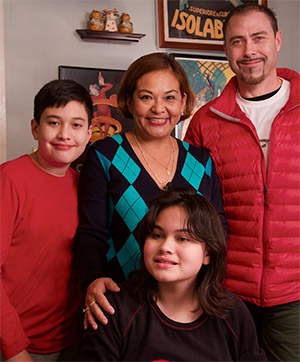 |
Dylan is an extremely bright 13-year-old boy who enjoys playing games on his computer. Mia, his 11-year-old sister, enjoys spending time creating detailed artwork and playing with her pets. Both siblings have autism. At age 10, Dylan—who has an exceptional ability to recall past conversations, things he has seen, and things he has read—was diagnosed with ASD. Mia was diagnosed at the early age of two because she was not meeting developmental milestones. Although Mia recognizes facial expressions, she still has difficulty understanding the intent of others in social situations. |
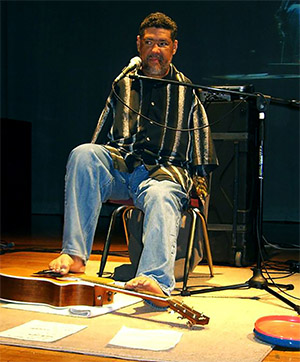 |
As a result of his mother taking thalidomide, a drug prescribed to reduce the symptoms of morning sickness during pregnancy, Tony Melendez was born without arms. A multi-talented songwriter and entertainer, Tony plays the guitar using his feet. Mr. Melendez has entertained audiences around the world, including several performances for Pope John Paul II, and he has been the recipient of dozens of awards, commendations, and honors, including from former President Ronald Reagan. Tony continues to release music through his company, Toe Jam Music. Photo is courtesy of Tony Melendez, https://www.tonymelendez.com/ |
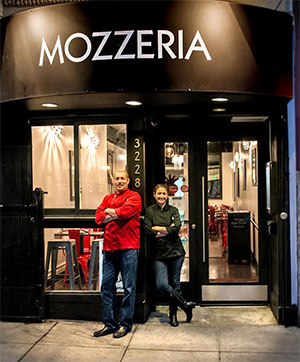 |
Russ and Melody Stein, a Deaf couple, founded Mozzeria, a four-star restaurant in San Francisco. Although they closed the restaurant in 2020, they continue to operate a pizza truck in the city. At the same time as the San Francisco location was closing, they opened a new pizzeria in Washington, DC. The location is special to the couple, who met there while attending the world-renowned school for the deaf and hard of hearing Gallaudet University. Mozzeria is staffed by Deaf employees. Their goal is to reduce unemployment and underemployment in the Deaf community by offering employment as well as franchising opportunities. Photo is courtesy Russ and Melody Stein. Photograph by Clare Cassidy Photography. https://mozzeria.com/#welcome |
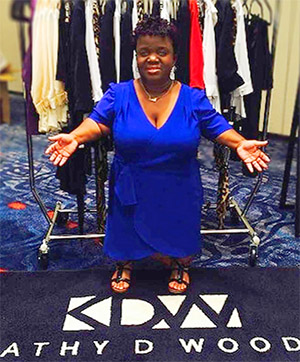 |
Kathy D. Woods is a former pre-school teacher who now owns and operates a women’s clothing line for adults of small stature. Kathy embraced her entrepreneurial spirit and began the KDW Collection, the first ever ready-to-wear clothing line for little people. A disability awareness activist and advocate, Ms. Woods is also a promoter for Step ‘n Wash, a system designed to help little people to more safely reach sinks and faucets in public accommodations. In 2015, she was a guest of President Barack Obama and First Lady Michelle Obama at the White House’s 25th Anniversary celebration of the Americans with Disabilities Act. Photo is courtesy Kathy D. Woods, https://www.kathydwoodsstore.com/Default.asp |
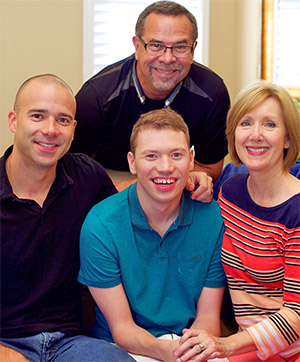 |
Meet the Smith family. Jim and Leona have two sons, Lance and Taylor. Taylor (front middle) has Angelman Syndrome, a genetic disorder that causes developmental disabilities, can affect a person’s ability to speak, and often causes other neurological issues like seizures. Individuals with this disorder are generally happy and frequently burst into smiles and laughter, although not always at socially appropriate times. In the interviews below, Lance gives his perspective on having a sibling with a disability. Next, Leona discusses family dynamics and considerations for parents. |
|
For any sibling that has a brother or sister with special needs, look at it as an opportunity to grow, learn, gain, get an advantage on the world, honestly. Because everyone else that has no experience with anyone with special needs sees the world in a certain way. I mean we’re conditioned by society, by pop culture, by entertainment that our world is built XYZ, built a certain way. And when you have someone with special needs, someone with a disability in your family, your perspective changes immensely. And my advice is to accept that and take that as a badge of honor. Learn from it, grow from it, and allow your experience with that person in your family to help you grow, make you see the world differently from a higher perspective. And then really there’s a lot to be gained from it. I think people think, “Oh, woe is you that has to deal with this burden.” But, while the needs themselves can be burdensome, the person can teach you more than you ever would have thought. So you just have to look at it and take it from sort of a great learning experience. I wouldn’t change it for the world. I love my brother.
Lance is such a good hearted young man that he did honestly help us raise Taylor because it was his desire for his little brother. He loved him so much and he never once thought, “Oh, look what I’ve got to do” or go gripe to his friends. Never ever ever. He was always so sweet and loving. There were struggles but it made it easy to have all hands on deck so to speak. And so the family dynamic was, I would say, of good posture. That’s a good way to say it because of Lance honestly. Taylor is the love of our life. We’ve always said that if there’s somewhere that Taylor can’t go, perhaps we shouldn’t go. He goes to the Titans ball games. He goes to concerts. Lance went on tour with the Dixie Chicks in his earlier career. And we took Taylor to the Dixie Chicks concert. He’s been to symphonies; he’s been to plays. He loves to watch opera on TV. We’ve taken him on a submarine tour. Embrace the child. And the disability is something that goes along with the child because that is part of the child. Lance excels in his career. And we embrace that and we love him. And we love Taylor even though they’re so different. But they’re still both our children and we love them equally. We have to pay a little bit more attention to Taylor sometimes, but just embrace the child. |
|
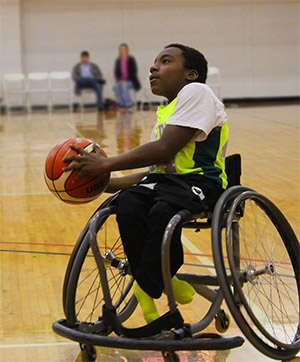 |
Jay is a member of Music City Thunder, a competitive, organized wheelchair basketball team. Music City Thunder is part of ABLE Youth, a program designed to create opportunities for young people who use wheelchairs to learn independence, skills, and sports, as well as to build self-confidence. In practice and in tournaments, players like Jay discover what they are able to do on the court, both individually and as a team. |
